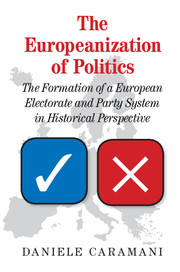 The Europeanization of Politics
The Europeanization of Politics from Appendices
Published online by Cambridge University Press: 05 November 2015
In many cases names of parties change over time. Because a detailed description is not a priority of this book, shortcuts and simplified names are used. Table A.1.1 indicates which parties are included in each family. For the general criteria for the attribution of codes, see Chapter 2.
For four small families no table has been produced:
Animalist parties: there is only one such party, namely the PvdD in the Netherlands between 2006 and 2010.
Pro-alcohol parties: there are only two instances: the SPP-Beer in 1992–6 in the Czech Republic and the PPPP in 1991–3 in Poland.
Feminist parties: three such parties existed in Iceland (WA in 1983–99), Latvia (SS in 1931), and Lithuania (LMP-Women's Party in 1996–2000), in addition to the Slovenian GZS and the Swedish Feminist Initiative (both in EP elections only).
Pro-European parties in national elections: the EK in Cyprus has been considered (1981–2001), as well as three Czech parties (SNK in 2002–10, DU in 1996–2002 and US 1998–2002). Most pro-European parties run in EP elections (see Table A.1.2).
In Table A.1.1 dates refer to election years with the indication of the first and last elections contested by each party and in which the party received at least 1 per cent of votes nationwide. Periods between the first and last elections during which a party did not exist or did not reach the 1 per cent threshold for inclusion in the analysis are not reported. Party families are listed alphabetically. Czech Republic as Czechoslovakia from World War I until separation. As far as European elections are concerned, parties that participate exclusively in elections to the EP (i.e. do not appear in figures for national elections) are listed in Table A.1.2.
To save this book to your Kindle, first ensure [email protected] is added to your Approved Personal Document E-mail List under your Personal Document Settings on the Manage Your Content and Devices page of your Amazon account. Then enter the ‘name’ part of your Kindle email address below. Find out more about saving to your Kindle.
Note you can select to save to either the @free.kindle.com or @kindle.com variations. ‘@free.kindle.com’ emails are free but can only be saved to your device when it is connected to wi-fi. ‘@kindle.com’ emails can be delivered even when you are not connected to wi-fi, but note that service fees apply.
Find out more about the Kindle Personal Document Service.
To save content items to your account, please confirm that you agree to abide by our usage policies. If this is the first time you use this feature, you will be asked to authorise Cambridge Core to connect with your account. Find out more about saving content to Dropbox.
To save content items to your account, please confirm that you agree to abide by our usage policies. If this is the first time you use this feature, you will be asked to authorise Cambridge Core to connect with your account. Find out more about saving content to Google Drive.